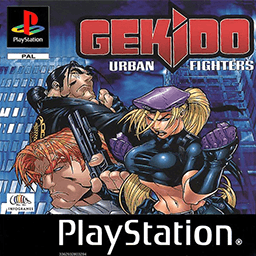Gekido
| Gekido: Urban Fighters | |
|---|---|
 | |
| Developer(s) | NAPS team |
| Publisher(s) | Interplay, Infogrames, Zoo Digital Publishing |
| Platform(s) | PlayStation |
| Release | |
| Genre(s) | Beat 'em up, Fighting |
| Mode(s) | Players: 1-4 |
Gekido: Urban Fighters is a beat 'em up video game for the PlayStation console, created by Italian studio NAPS Team. The game uses a fast paced beat 'em up system, with many bosses and a colorful design in terms of graphics. The game features the music of Fatboy Slim and Apartment 26. Marvel comic book artist Joe Madureira also contributed. Versions of Gekido were also planned for the Game Boy Color and N-Gage but were never released. It was later followed by a GBA sequel called Gekido Advance: Kintaro's Revenge. A second sequel had been announced, entitled Gekido: The Dark Angel.
Story
In a time where there is great corruption and terror, a young girl named Angela has been kidnapped. Rumor has it that Kintaro has made a deal with the devil. Angela's parents hire Travis, a private detective, to investigate the crime boss Kintaro and retrieve Angela. Knowing that the mission to rescue Angela will not be easy, he is aided by three sidekicks, Michelle, Ushi, and Tetsuo.
Game modes and gameplay
In the game you defeat enemies using combos and weapons. You also have a Rage Meter which builds up, allowing you to perform special attacks and gain abilities, and a Wipeout Meter which fills up, allowing you to perform a powerful attack.
- Urban Fighters - The Story Mode the players are found in a 3D side-scrolling adventure. The gameplay derives from classics such as Streets of Rage and Double Dragon, in which you are given a certain amount of time to defeat enemies and proceed to the next level, except in a 3D environment.
- Arena Battle - A two to four player versus fighting mode.
Unlockable modes
- Shadow Fighter (Unlocked by beating Urban Fighters mode once) - Plays much like a standard fighting game you fight enemies one sometimes two at a time and you must defeat them in 2 out of 3 rounds.
- Survivor (Unlocked by beating Urban Fighters mode twice) - Same as Shadow Fighter except you only have one round and you can't lose.
- Team Battle (Unlocked by beating Urban Fighters mode three times) - Same as Arena Battle except you can group players into teams.
- Street Gang Battle (Unlocked by beating Urban Fighters mode with Kintaro, Angela, or Akujin) - A one on one fighting mode were players fight with the help of CPU allies.
Playable characters
- Travis (Street Fighting)
- Michelle (Military)
- Ushi (Brute Force)
- Tetsuo (Martial Arts)
Unlockable characters
- Kobuchi - (Unlocked by beating Urban Fighters mode with Tetsuo and Ushi)
- Gorilla - (Unlocked by beating Urban Fighters mode with Travis and Michelle)
- Kintaro - (Beat Urban Fighters mode with Gorilla to unlock Kintaro in all modes except Urban Fighters mode. Beat Urban Fighters mode on the hard difficulty setting to unlock Kintaro in Urban Fighters mode)
- Angela - (Beat Urban Fighters mode with Kobuchi to unlock Angela in all modes except Urban Fighters mode. Beat Urban Fighters mode on the hard difficulty setting to unlock Angela in Urban Fighters mode)
- Akujin - (Unlocked by beating Urban Fighters mode on the hard difficulty setting)
Reception
| Reception | ||||||||||||||||||||||||
|---|---|---|---|---|---|---|---|---|---|---|---|---|---|---|---|---|---|---|---|---|---|---|---|---|
| ||||||||||||||||||||||||
The game received "average" reviews according to the review aggregation website GameRankings.[1]
Sequels
Gekido Advance: Kintaro's Revenge
A sequel to the game for the Game Boy Advance.
Gekido: The Dark Angel
The developer, NAPS Team, announced that a second sequel was in development for the PlayStation Portable titled Gekido: The Dark Angel. A few screenshots and a trailer were released. The release date was projected to be December 2006. The teaser trailer for Gekido: The Dark Angel resembles anime-like characters and a character named Samuel with looks that seem to have been inspired by Dante from Capcom's Devil May Cry. The gameplay seems to take place in a stunning 3D world with vast environments. The interview provided by PSMania that can be found on IGN, states the developer moved the environment in the game from Japan to Italy.
Gekido: Kintaro's Revenge
A game for the Nintendo Switch was released on March 22, 2018.[9][10]
References
- 1 2 "Gekido for PlayStation". GameRankings. Retrieved November 25, 2016.
- ↑ Woods, Nick. "Gekido: Urban Fighters - Review". AllGame. Archived from the original on November 16, 2014. Retrieved November 25, 2016.
- ↑ "Gekido". Electronic Gaming Monthly. 2000.
- ↑ "Gekido: Urban Fighters". Game Informer (87). July 2000.
- ↑ The D-Pad Destroyer (May 29, 2000). "Gekido Review for PlayStation on GamePro.com". GamePro. Archived from the original on March 12, 2005. Retrieved November 25, 2016.
- ↑ Provo, Frank (May 31, 2000). "Gekido Review". GameSpot. Retrieved November 25, 2016.
- ↑ Zdyrko, David (June 2, 2000). "Gekido". IGN. Retrieved November 25, 2016.
- ↑ "Gekido". Official U.S. PlayStation Magazine. 2000.
- ↑ "⭐️Preorder: 8 March 2018 ⭐️Release : 22 March 2018". Twitter. Retrieved March 8, 2018.
- ↑ http://www.nintendolife.com/reviews/switch-eshop/gekido_kintaros_revenge
External links
- NAPS TEAM Official Website
- Gekido at MobyGames
- Official website for Gekido: The Dark Angel at the Wayback Machine (archived January 28, 2011)